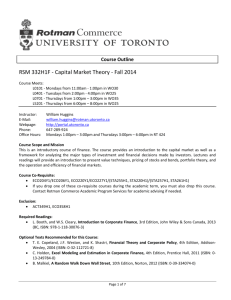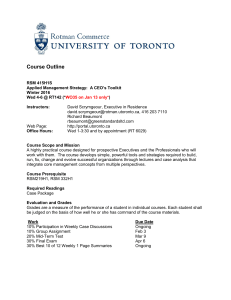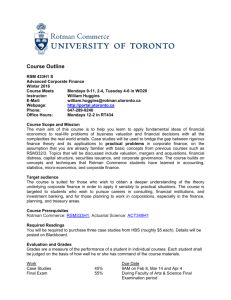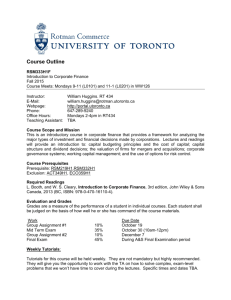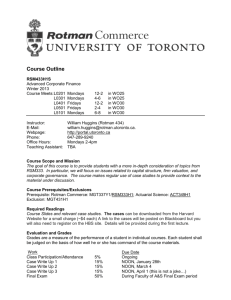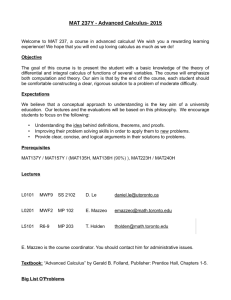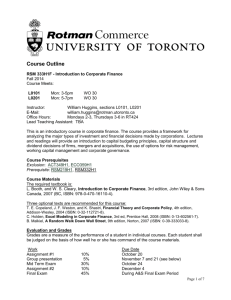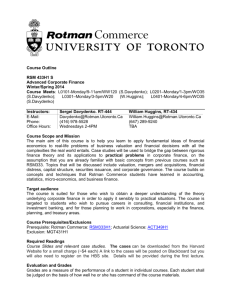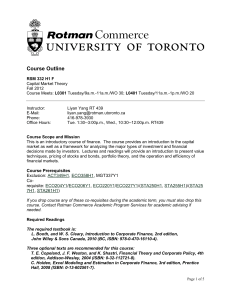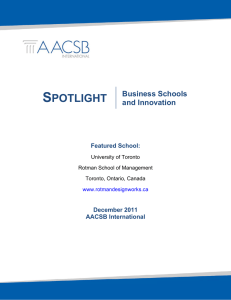Course Outline - University of Toronto
advertisement
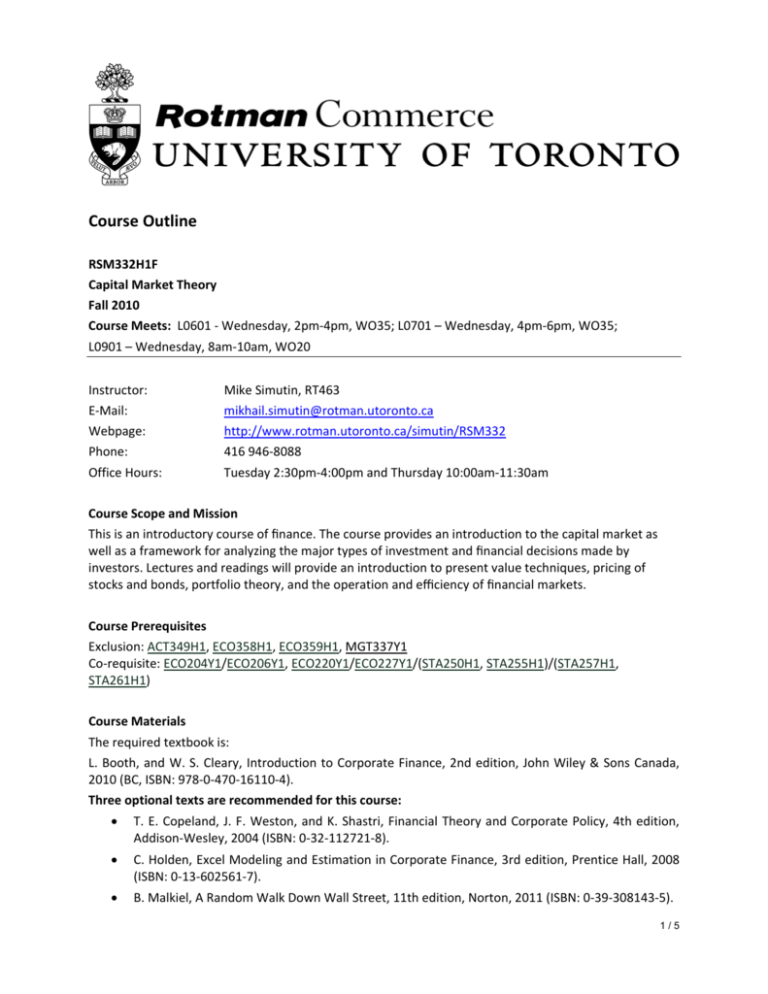
Course Outline RSM332H1F Capital Market Theory Fall 2010 Course Meets: L0601 ‐ Wednesday, 2pm‐4pm, WO35; L0701 – Wednesday, 4pm‐6pm, WO35; L0901 – Wednesday, 8am‐10am, WO20 Instructor: Mike Simutin, RT463 E‐Mail: mikhail.simutin@rotman.utoronto.ca Webpage: http://www.rotman.utoronto.ca/simutin/RSM332 Phone: 416 946‐8088 Office Hours: Tuesday 2:30pm‐4:00pm and Thursday 10:00am‐11:30am Course Scope and Mission This is an introductory course of finance. The course provides an introduction to the capital market as well as a framework for analyzing the major types of investment and financial decisions made by investors. Lectures and readings will provide an introduction to present value techniques, pricing of stocks and bonds, portfolio theory, and the operation and efficiency of financial markets. Course Prerequisites Exclusion: ACT349H1, ECO358H1, ECO359H1, MGT337Y1 Co‐requisite: ECO204Y1/ECO206Y1, ECO220Y1/ECO227Y1/(STA250H1, STA255H1)/(STA257H1, STA261H1) Course Materials The required textbook is: L. Booth, and W. S. Cleary, Introduction to Corporate Finance, 2nd edition, John Wiley & Sons Canada, 2010 (BC, ISBN: 978‐0‐470‐16110‐4). Three optional texts are recommended for this course: T. E. Copeland, J. F. Weston, and K. Shastri, Financial Theory and Corporate Policy, 4th edition, Addison‐Wesley, 2004 (ISBN: 0‐32‐112721‐8). C. Holden, Excel Modeling and Estimation in Corporate Finance, 3rd edition, Prentice Hall, 2008 (ISBN: 0‐13‐602561‐7). B. Malkiel, A Random Walk Down Wall Street, 11th edition, Norton, 2011 (ISBN: 0‐39‐308143‐5). 1/5 Course Requirements and Grading There will be one midterm counting for 30% and one final examination counting for 60% of the course grade. For the examinations, you are allowed to bring in a calculator and an 8.5 × 11 inch single‐sided “cheat sheet” on which you may write down whatever you wish. If the sheet is typed or contains photocopied materials, the font size has to be 10 point or larger. If you miss an examination, it is important that you inform me and the commerce office right away. In case you miss the examination for legitimate reasons, a makeup test will be given. In addition, there will be two problem sets, covering different topics in the course. Doing these problem sets is essential to obtaining a good understanding of the course materials. These problem sets are to be turned in and graded. Each problem set will receive a grade of 0–4, where 0 gets no credit and 4 gets 100% credit. The two problem sets count for 10% of the final grade and they will be important determinants in borderline cases. You are encouraged to work in groups on the problem sets. You should, however, independently write up your own assignment. Problem set #1 is due at the start of the class on October 13, and problem set #2 is due by 1pm on December 7. Late problem sets are not accepted. Except for unusual circumstances, grades on homework assignments are final and regrading requests will not be accepted. Course Website The course website, http://www.rotman.utoronto.ca/simutin/RSM332, will have announcements, lecture slides, assignments, solutions to assignments, sample exams, extra problems, etc. Check it regularly. TA Sessions Xiaofei Zhao (E‐mail: xiaofei.zhao08@rotman.utoronto.ca), the lead TA for the course, will hold three weekly tutorials at the following times: Wednesday 11am‐1pm MP102 Friday 1pm‐3pm MP202 Friday 3pm‐5pm MP202 MP is McLennan Physical Labs, located at 255 Huron Street. The first tutorial will be on September 20 and the last one will be on December 10. Xiaofei will maintain a website, http://332ta.raykan.com, where he will post some useful materials. Finance Research and Trading Lab Training Sessions Finally, Rotman has a fantastic Finance Research and Trading Lab that will allow you to see the practical side of what you learn in the course (http://www.rotman.utoronto.ca/finance/lab/default.asp). There will be three training sessions for each resource scheduled specifically for RSM332 students: Reuters/Bloomberg: (1) Nov 1, 3pm‐4pm; (2) Nov 3, 11am‐12pm; (3) Nov 4, 11am‐12pm Capital IQ: (1) Nov 22, 3pm‐4pm; (2) Nov 25, 5pm‐6pm; (3) Nov 26, 11am‐12pm Rotman Interactive Trader: (1) Nov 8, 3pm‐4pm; (2) Nov 10, 11am‐12pm; (3) Nov 10, 12pm‐1pm These sessions are not required (i.e., they will not be tested on exam), but they are valuable and highly recommended. Lab schedule is available at http://www.rotman.utoronto.ca/finance/lab/schedule.asp. 2/5 Missed Midterms Students may miss a midterm test due to illness, domestic affliction, or in the case of part time students, work commitments, without academic penalty providing the appropriate documentation is received and approved in a timely manner. In such cases students must notify Rotman Commerce on the date of the missed midterm and a medical certificate, employer’s letter or other supporting evidence must be submitted to Rotman Commerce within 48 hours of the due date of the assignment or the test date. Students who do not provide Rotman Commerce or the instructor appropriate or sufficient supporting documentation will be given a grade of 0 (zero) for the test. Accessibility Needs and Academic Honesty Accessibility Needs The University of Toronto is committed to accessibility. If you require accommodations for a disability, or have any accessibility concerns about the course, the classroom or course materials, please contact Accessibility Services as soon as possible: disability.services@utoronto.ca or http://www.accessibility.utoronto.ca/. Academic Integrity Academic Integrity is a fundamental value essential to the pursuit of learning and scholarships at the University of Toronto. Participating honestly, respectively, responsibly, and fairly in this academic community ensures that the UofT degree that you earn will continue to be valued and respected as a true signifier of a student's individual work and academic achievement. As a result, the University treats cases of academic misconduct very seriously. The University of Toronto’s Code of Behaviour on Academic Matters http://www.governingcouncil.utoronto.ca/policies/behaveac.htm outlines the behaviours that constitute academic misconduct, the process for addressing academic offences, and the penalties that may be imposed. You are expected to be familiar with the contents of this document. Potential offences include, but are not limited to: In papers and assignments: Using someone else's ideas or words without appropriate acknowledgement. Submitting your own work in more than one course without the permission of the instructor. Making up sources or facts. Obtaining or providing unauthorized assistance on any assignment (this includes collaborating with others on assignments that are supposed to be completed individually). On test and exams: Using or possessing any unauthorized aid, including a cell phone. Looking at someone else's answers Misrepresenting your identity. Submitting an altered test for re‐grading. 3/5 Misrepresentation: Falsifying institutional documents or grades. Falsifying or altering any documentation required by the University, including (but not limited to), medical notes. All suspected cases of academic dishonesty will be investigated by the following procedures outlined in the Code of Behaviour on Academic Matters. If you have any question about what is or not is permitted in the course, please do not hesitate to contact the course instructor. If you have any questions about appropriate research and citation methods, you are expected to seek out additional information from the instructor or other UofT resources such as College Writing Centres or the Academic Success Centre. Email At times, the course instructor may decide to communicate important course information by email. As such, all UofT students are required to have a valid UofT email address. You are responsible for ensuring that your UofT email address is set up AND properly entered on the ROSI system. Forwarding your utoronto.ca email to a Hotmail, Gmail, Yahoo or other type of email account is not advisable. In some cases, messages from utoronto.ca addresses sent to Hotmail, Gmail or Yahoo accounts are filtered as junk mail, which means that important messages from your course instructor may end up in your spam or junk mail folder. 4/5 The approximate lecture schedule for the course is: TOPIC Introduction: Introduction to the course: BC (Ch.1–2) (Note: if you need to refresh financial accounting, review Ch.3 and Ch.4.1–4.7 as well) Financial Markets and Net Present Value: Fisher’s Separation Theorem Present Value Concepts: Mathematics and application of present value: BC (Ch.5) Bond Valuation and Term Structure: Theory Bonds and introduction to theory of term structure of interest rates: BC (Ch.6, excluding appendix) Valuation of Stocks: Common stock valuation and growth opportunities: BC (Ch.4.8, Ch.7) Due date for problem set #1 Optional Review(s) for Midterm Exam Review dates and locations to be announced in early‐mid October Midterm: Time: 8pm‐10pm, Location: Examination Facility. Midterm will cover material up to and including Oct 13. Risk and Return: Trade‐off between risk and return, statistics review: BC (Ch.8.1–8.3, 8.5) Portfolio Theory: Portfolio mathematics, diversification, efficient portfolios: BC (Ch.8.4, Appendix 8.A, Ch.9.1). Capital Asset Pricing Model: Introduction to the CAPM: BC (Ch.9.2–9.3) Arbitrage Pricing Theory: Factor models and the arbitrage pricing theory: BC (Ch.9.4) CAPM and APT: More on CAPM and APT Operation and Efficiency of Capital Markets: Efficient market hypothesis: BC (Ch.10) Course Review Due date for problem set #2; to be turned in by 1pm Optional Review(s) for Final Exam Review dates and locations to be announced in late November Date Sep 15 Sep 22 Sep 29 Oct 6 Oct 13 Oct TBA Oct 19 Oct 20 Oct 27 Nov 3 Nov 10 Nov 17 Nov 24 Dec 1 Dec 7 Dec TBA 5/5
